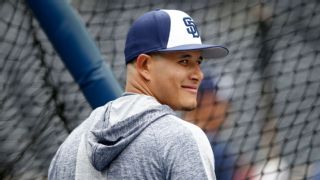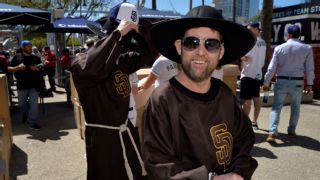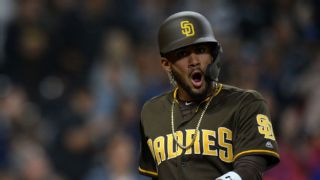|
SAN DIEGO -- A quarter-mile north of center field, in a 19th-century building adorned by a faded green awning and two wooden wagon wheels, sits a charmingly antiquated bar named Tivoli. It stands alone, but it is surrounded by streets lined with those trendy, new craft breweries that have permeated the area in recent years, a relic amid the gentrification. The Romero brothers -- Roy, Willy and Robert, all in their 70s -- own this place. When their parents bought it, for $10,000 up front in 1972, half of it was a warehouse, and the upstairs portion was a hotel that used to be a brothel. They spent $1 million on renovations more than 20 years ago, twice the amount they borrowed, and somehow sustained themselves through a time when so many similar spots were swallowed up. "We wouldn't be here if it wasn't for the baseball," Roy said while sipping a Corona on a Friday afternoon minutes before first pitch between the hometown San Diego Padres and the visiting Cincinnati Reds. Not long ago, this was a rugged, blue-collar community dominated by the produce industry. Now the neighboring establishment is a boutique hotel. Across the street sits an Italian bistro. Next to it lies an extravagant nightclub. Places such as these -- and countless others that make up the East Village portion of the Gaslamp Quarter, the downtown section of San Diego -- began sprouting in the wake of Petco Park's opening in 2004. The people here have spent 15 years waiting for a time such as this, when the local baseball team could give them something real, something sustainable, to get excited about. The Padres began the season with the consensus best farm system in the industry, signaling hope for the future. They signed Manny Machado to a $300 million contract, bringing excitement to the present. They ignored industry norms by placing Chris Paddack and Fernando Tatis Jr. on the Opening Day roster, sending a resounding message about their intentions. The enthusiasm has been noticeable, if not yet overwhelming. Tivoli generated upward of $20,000 in revenue for the March 28 game against the San Francisco Giants, a personal record for Opening Day. "The Giants fans didn't take it over," Roy noted. "Usually they would." The Romero brothers are longtime Padres fans, dating to the days when Qualcomm Stadium ran so empty that the doors would open to outsiders in the middle of games. They recalled how this city came alive during the World Series run of 1998. They remembered the decorated names that came through -- Kevin Brown, Gary Sheffield, Ken Caminiti, Rollie Fingers, Steve Garvey -- and how it never led to much of anything. They brought up the economic boost that Petco Park created and the general apathy that followed it, a product of 12 consecutive seasons without playoff baseball. The Padres are probably at least a year away from legitimate contention, but they see an immediate opportunity in front of them. They see a big city with a bustling downtown and a beautiful ballpark nestled in the heart of it. They see a sports landscape still reeling from the Chargers' departure to L.A. and a chance to fill some of the void that team left behind. They see the possibility of becoming the definitive franchise in a major metropolis, not unlike what the NBA's Spurs have carved out for themselves through sustained winning in San Antonio. Willy compared the Machado signing to "somebody throwing you a life preserver when you're sinking." Behind the bar, outside a space decorated by antique chandeliers and century-old photographs, sits a banner that reads "This Could Be The Season." It made Roy think about the possibility of the Padres someday winning the World Series and capturing the only major San Diego title besides that 1963 AFL championship few even know about. "This town," Roy said, "would go crazy."   Machado will readily acknowledge that the Padres were not his first choice, largely because he never imagined them being able to afford him. They didn't reach out until the middle of January and didn't thrust themselves into the conversation until spring training was nearing. When negotiations got serious, Machado tried to learn everything he could about the organization as quickly as possible. On most days that first week, when his stint with the Padres was fresh enough for doubt to creep in, he went home and told his wife something to the effect of "This is where we need to be." "Every day," Machado said, "it just got better and better." Machado, speaking to ESPN near the end of March, said he was impressed by the talented young players he met during camp and became intrigued by the possibility of mentoring some of them. He admitted that it was "tough" to move from shortstop, his preferred position, and return to third base, his better position. But he has since embraced it. "I was only going to do it for the right situation," Machado said, "and this is the right situation." It's the right situation because of Tatis, one of the industry's brightest prospects, who has validated the hype with a .291/.360/.595 slash line through his first 22 major league games. Half a decade ago, Tatis identified Machado as a player he could model his game after. He was tall like him, a shortstop like him, and he hit and played defense like him. "We have kind of the same game," Tatis said. "I'm just a little bit faster." Padres manager Andy Green was asked about the Machado-Tatis dynamic and noted that they "have fun," which can at times be more important than actual instruction. He compared it to the playful relationship Elvis Andrus and Adrian Beltre shared on the Texas Rangers. "I have no clue what they're saying 90 percent of the time," Green said, "but you can see the emotions coming off. They're enjoying being next to each other, they're enjoying playing together and they're enjoying challenging each other. They're trying to one-up one another. And it goes a long way. That over everything else." Machado and Tatis share an agency, MVP Sports Group, which arranged for the two of them to meet over dinner for the first time last summer in Washington, D.C. Machado was there for the All-Star Game; Tatis was taking part in the Futures Game. They sat next to each other, talked throughout the night, stayed in touch thereafter and became teammates seven months later. Tatis was initially devastated when the Chicago White Sox traded him in June 2016. He was 17 years old and predictably emotional. But now he is on a team with his idol during one of the most exciting stretches in franchise history. "What can I say? Small world, small game," Tatis said. "I think God has a perfect plan for everybody."   When Major League Baseball released its list of the 20 most popular jerseys on Opening Day, Machado's ranked 12th, marking the first time that a Padres player had been mentioned. The Machado announcement on Feb. 19 prompted Padres ticket sales to nearly triple, according to numbers released by StubHub. Since then, the team has experienced a 44 percent increase in ticket sales from last season, representing the league's second-largest spike. The Padres' spring training games were the highest rated in Fox Sports San Diego history; the first road trip of 2019 outrated the first road trip of 2018 by 85 percent. Craig Stammen, a reliever in his third year with the Padres, has noticed a more engaged, invested home crowd this season, evidenced by the boos that filled Petco Park during the late stages of a 10-3 loss to the Arizona Diamondbacks on April 1. The prior series, Stammen said, marked "the first time the Giants fans were drowned out within Petco Park" in his stint with the team. San Diego is a city of transplants. There is a segment of serious baseball fans within it, but it's not as large as one would hope for such a populous region. The culture is laid-back, and the losing has augmented indifference. Tony Gwynn and Trevor Hoffman have statues outside Petco Park, but no other player comes close to igniting the reaction -- good or bad -- that Machado generates. The Padres made a landmark signing last year by luring Eric Hosmer with an eight-year, $144 million contract, and Kevin Acee, a former San Diego Union-Tribune columnist who now exclusively covers the Padres, remembers how little the fans cared when his name was announced on Opening Day. "That's San Diego," Acee said. "Big, little town or little, big town -- whatever you want, they both apply." Padres history is littered with moments when big-name players were brought in for potential championship runs that preceded fire sales. It happened in the 1980s, a spending spree highlighted by the additions of Graig Nettles and Goose Gossage. And in the early '90s, when Sheffield and Fred McGriff came on board. And in the mid-'90s, with Caminiti and Brown. And just recently, when general manager A.J. Preller added Matt Kemp, Justin Upton, James Shields and Craig Kimbrel from 2014 to 2015, only to part with all of them after back-to-back sub-.500 seasons. The foundation that was frantically built in the aftermath was the type that made Acee, and so many others, believe this time might be different. The Machado signing validated that thinking. "What's always happened here is the Padres lose their Manny Machados," Acee said. "That's what we had become accustomed to." Machado joined the Padres a little early in their trajectory, but he's only 26, which means he should still be an elite player when the Padres' prospects begin to make an impact at the major league level. Tatis, acquired in exchange for Shields, might already be just as good. The starting rotation is a problem now, but the farm system boasts the likes of MacKenzie Gore, Luis Patino, Adrian Morejon and Michel Baez, who should soon join Paddack and pay dividends. Erik Greupner, the Padres' president of business operations, mentioned the "tremendous opportunity" presented by the Chargers' departure in 2017 but also the "tremendous obligation" that came with it. It's one Machado already knows about. "We can bring something very special to the city of San Diego," he said. "It's a city that's been waiting for a championship for a very long time. We're obviously the only professional team there now, so we're the main attraction. Everyone wants to come see us play. So if we can come up here, do something special and bring a championship to the city, I think the city's going to erupt."   Damion Easley spent the 2008 season playing alongside Fernando Tatis Sr. on the New York Mets. He was introduced to Tatis' son in the middle of 2016, in his role of rehabbing Padres players at the team's facility in Peoria, Arizona. The organization's Arizona League team played out of there, and Easley, a major league infielder for 17 years, worked closely with Tatis Jr. that summer. He noticed the loose limbs, the natural athleticism and the easy power that were already becoming obvious, and he also saw what he considered "an advanced mind." Still, his expectations were tempered. "At that level, when they're young, you see a lot of ability in a lot of different guys," Easley said. "You just wonder if it's going to mold into some consistency and if it's going to turn into a weapon. And each year, he got better. Each year, he got better and better and more consistent." A longtime scout who covers the National League West identified "ability to adjust" as Tatis' best attribute, a skill Easley deemed the most critical to sustained success. Green is already starting to see glimpses. Tatis put together three consecutive poor at-bats against the Colorado Rockies on Tuesday. In his fourth, he waited on an outside-corner fastball and hit an opposite-field line drive off the fence. Tatis was moved from sixth to first in the batting order for the following game in hopes of sparking a Padres offense that sported a .300 on-base percentage. He saw 14 pitches in his first two plate appearances, lining a single up the middle in the first inning and taking a borderline pitch for a caught-looking strikeout in his second. PITCHf/x showed that it might have been an inch low and away. "I see a big league hitter right now," Easley said. "You forget that he's only 20 years old because he goes about it the right way. He goes about it like a major league hitter, not a 20-year-old. You watch him and you see composure. You don't see panic."  The initial surge has faded. The Padres, owners of the sport's youngest roster, began the 2019 season with 11 wins in their first 16 games, then rode a six-game losing streak that wasn't snapped until Sunday. The offense, besides Tatis, has struggled. The rotation, Paddack included, has taken its lumps. The team's record is 12-11, but its run differential is minus-17, signaling looming trouble. A block away from Petco Park sits one of those new gastropubs, Bub's at the Ballpark, considered the closest sports bar to the Padres' home stadium. Thirty-two flat-screen TVs are sprinkled throughout the modern-industrial venue. On this particular Friday night, with the NBA and NHL playoffs in full steam, seven of them are turned to Padres-Reds, including the two largest. Only a couple of tables are empty. The general manager of this place, Taylor McCutcheon, said Bub's would generate somewhere in the neighborhood of $20,000 on a typical Friday during baseball season. On this night, with a game against a relatively unpopular team, McCutcheon projected upward of $27,000. "It's a big bump for us," he said. McCutcheon is a 30-year-old who was raised in San Diego and identifies as a lifelong Padres fan. He hasn't been this excited about the team in 20 years and said the energy in downtown San Diego has rivaled what he experienced when the area hosted the All-Star Game three seasons ago. McCutcheon talked about how defeating it was to see his team out of contention by that point each season and not have another professional team to root for. He called 2019 "a growing year" but added that the fan base holds "big hope for next year." Someday, he believes, the Padres might own this city. "It's going to take more years like this. They have to keep that energy and momentum going," McCutcheon said. "But everybody I talk to is rooting for them. Everybody that comes into this bar is very, very excited. People want to go to the games. People want something to do. They just have to win a little."
|


